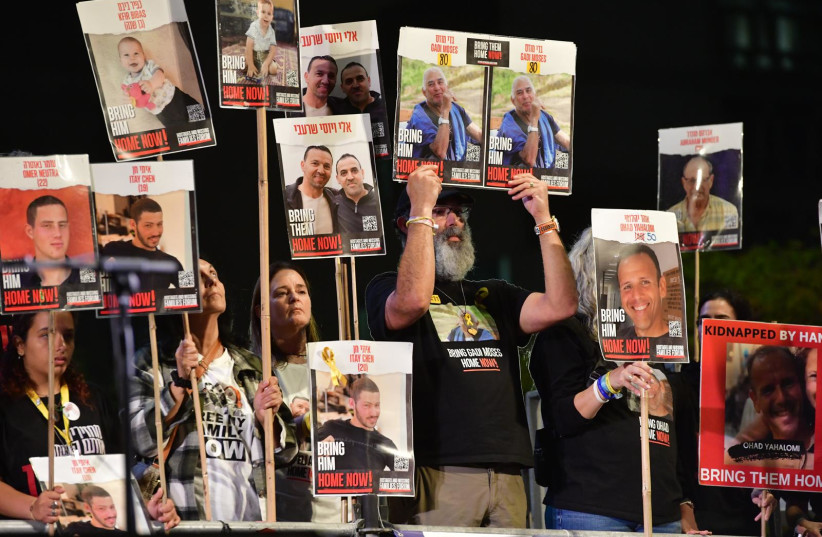In the last week or two, it has become extremely difficult to focus on any one of numerous events, each of which has caused a good deal of commotion, emotions, and controversy.
Among the recent issues and events have been the tug of war between the United States and Israel over an Israeli invasion of Rafah; the negotiations with Hamas on the return of the remaining 132 hostages in return for the termination of the current war in the Gaza Strip; the annual Eurovision contest, on Saturday night in Sweden, against the background of violent pro-Palestinian demonstrations; and the commemoration of the fallen fighters in military operations and victims of terrorism over the years with the consecutive celebration of Israel’s 76th Independence Day.
Since the second half of February, the US has sought to prevent a major Israeli operation in Rafah, both because it maintains that this will merely prolong the war without necessarily bringing about the sought “absolute victory” over Hamas, and because the presence of around one and a half million displaced Gazans from the northern Gaza Strip in the Rafah area potentially puts a large number of civilians at risk.
There appears to be a very wide consensus among Israeli politicians from all parts of the spectrum, as well as from the various security forces and most sections of the Jewish Israeli public, about the need for such an operation in the service of defeating the Hamas fighting units still existing in Rafah, and destroying Hamas infrastructures above and below ground in the southern Gazan city.
However, there are differences of opinion as to whether the operation in Rafah should precede or succeed the release of the remaining 132 hostages; and whether Israel should deliberately act contrary to the requests/diktats of President Joe Biden – who has warned/threatened that the US will cut its arms and munitions deliveries to Israel if the Jewish state does not heed US requests.
The debate over the issue of the price Israel should be willing to pay for the return of the hostages has also reached ugly levels of mutual accusations. On the one hand, members of the government, including Prime Minister Benjamin Netanyahu, keep demanding that the families and well-wishers of the hostages become less vocal and aggressive in their battle for the immediate return of all the hostages because this weakens Israel’s position in the negotiations for their release.
What will the government policy be on freeing the hostages?
Most of the hostages’ families, on the other hand, argue that Netanyahu is willing to sacrifice the hostages for a military victory over Hamas; and that because the majority of hostages’ families support Netanyahu’s opponents, he is not willing to pay the necessary price for the hostages’ release, for fear that price will result in him losing his all-Right coalition.
Furthermore, the families feel that he and his government tend to ignore them, to the point of not establishing contact with them, or expressing understanding for their plight. The hostages’ families also point out that time is running out for the hostages. Many were either taken into Gaza already dead; others have died under all sorts of circumstances in captivity since October 7; and the remainder are living on borrowed time and in extremely inhumane conditions.
THIS YEAR, the Eurovision Song Contest has turned into part and parcel of the ongoing war between Israel and Hamas, with the poisonous anti-Israeli and pro-Palestinian demonstrations that have invaded the streets and university campuses in many countries, also reaching the streets of Malmö and the Arena hall in which the competition was held.
While we continued to insist on discussing the performance qualities of our representative to the competition this year – 20-year-old Eden Golan and the version of the song she actually delivered, a complete rewrite of the original song she had been preparing, found to be “politically unacceptable” by the European Broadcasting Union – under whose auspices the annual song contest is held – the real issues were different.
These issues resulted from the fact that Israel’s international status has deteriorated to such an extent because of the war in the Gaza Strip, that its very participation in the 2024 Eurovision contest was even called into question. Enabling Israel’s participation involved unprecedented security arrangements – at an exorbitant cost to the hosts and organizers of the contest, and the State of Israel.
Furthermore, when they were not rehearsing or performing at the Arena, the Israeli team was locked up in their hotel and its location was kept under wraps. The whole situation required Eden to demonstrate not only performance capabilities (which she certainly has), but also exceptional courage and superhuman unflappability, in the face of constant efforts by demonstrators to disturb the Israeli performance, as well as physical threats to her person.
One can argue whether Israel’s insistence on participating despite the circumstances did more harm than good, but no alternative was seriously considered.
Even the other participants in the contest, who were not necessarily anti-Israel, did not hide their feelings that Israel’s presence at the event was a nuisance, and the fact that they would have been happier had Israel decided to keep away altogether. We decided to stay on and finally emerged from the contest in fifth place, thanks primarily to the votes of the public – not to those of the national judges, who had us placed 12th, only.
THE COMMEMORATION ceremonies for the fallen on Remembrance Day followed immediately by Independence Day celebrations are somewhat of an emotional roller coaster, even in normal times, due to the rapid transition from a day of mourning to a day of joyous events to celebrate the establishment of the state of Israel and its achievements – during the now 76 years of its existence.
This year, after October 7 and the inconclusive results of the last seven months of fighting, the situation is much more complicated than in previous years. Together with the fallen fighters in the last seven months of fighting and the civilians murdered by Hamas and other Palestinian terrorists on and since that black Saturday, the total number of fatalities in Israel’s wars and terror attacks against it has grown to over 25,000, raising the number of Israelis participating in the official memorial services for the fallen. This has also increased the level of controversy over the participation of political figures in the services; over their identity; and especially their speaking at these events.
There are also controversies over how we should celebrate Independence Day this year – some arguing that the celebrations should be more solemn and restrained, others pointing out that we must not be afraid to demonstrate happiness and joy. Netanyahu has decided to stay away from several of the events, presumably because he wishes to avoid potential demonstrations against him. The traditional lighting of the torches ceremony on Mt. Herzl will be broadcast tomorrow and was filmed in advance, without the presence of an audience, and with much less fanfare than usual.
My personal feeling is that this overload of controversial events, occurring simultaneously or in rapid succession, weighs heavily on large sections of the Israeli public.
Many of us are both physically and emotionally tired and need a respite.
The writer worked in the Knesset for many years as a researcher and has published extensively both journalistic and academic articles on current affairs and Israeli politics. Her most recent book, Israel’s Knesset Members - A Comparative Study of an Undefined Job, was published by Routledge.

